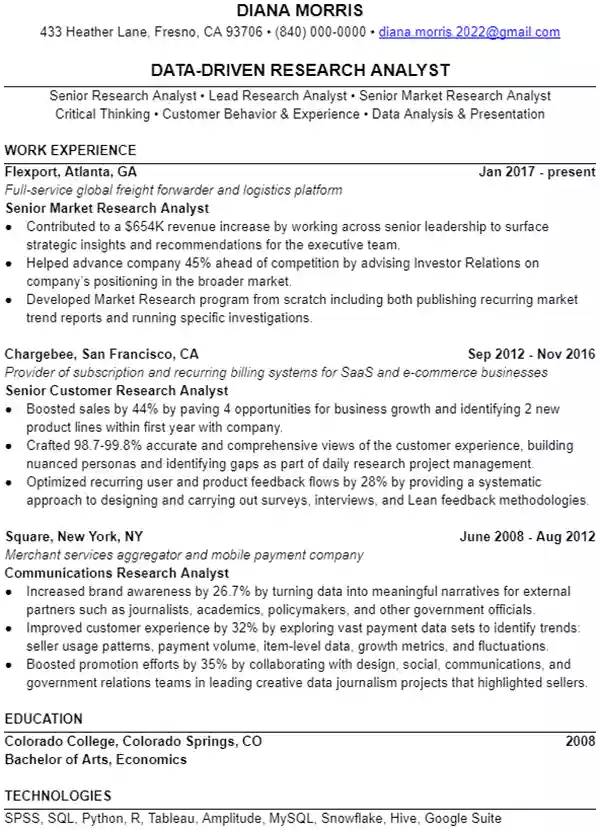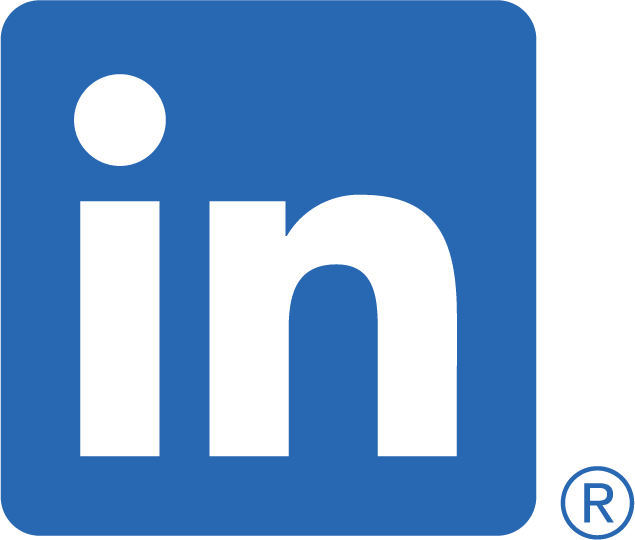Research Analyst Resume Example
Our practical, easy to follow guide to writing the perfect resume will help you land more Research Analyst job interviews. Leet Resumes writes resumes for free. Tips appreciated!


How to write a great Research Analyst resume
You’ve run the numbers and analyzed all of the data. More than once.
There’s only one logical conclusion.
If you want to reach your objective of landing a fantastic new job, you need to update your Research Analyst resume.
Of course, writing and structuring an eye-catching resume can be deceptively difficult.
You may be able to construct data charts, graphs, and pricing models with the best of them, but laying out your entire career on a single piece of paper somehow feels infinitely harder.
Believe it or not, the recipe for a winning Research Analyst resume isn’t all that different from putting together a scientifically sound research project.
Want to learn more? Below we’ll cover everything you need to know to write the best possible version of your Research Analyst resume.
If you’re not interested in writing your own resume, Leet Resumes is always available to write it for you.
We’re resume experts, and we write personalized resumes for free! (tips appreciated)
Why you need a great Research Analyst resume
Your job comes down to two main halves: Performing the research, and presenting your findings.
You know that one half is no less important than the other.
Let’s imagine you just discovered how to increase your company’s bottom line by 1,000%.
If you can’t compile your findings into an easily understandable, comprehensive report for decision makers, does your discovery really matter?
The same can be said for your career.
You may be the best Research Analyst there ever was or ever will be, but if your resume can’t convey that no one will ever know.
And that’s not even mentioning the countless other resumes that yours will be competing against.
Recruiters are absolutely inundated with resumes immediately after posting each and every job listing. Most estimates tell us the average job posting receives well over 100 applicants.
That means your Research Analyst resume needs to both showcase your career and stand out from the crowd.
Luckily, you already have everything you need to write a fantastic resume.
It’s true. After all, you would be absolutely drowning in figures and spreadsheets if it weren’t for your strong organizational skills.
Well, organization is key to a great resume that will get you more job interviews.
How to format your Research Analyst resume
Don’t concern yourself with outlining the ideal resume format. We already did that for you!
Here it is:
- Name + Contact
- Professional Headline
- Professional Summary
- Work Experience
- Education
- Keywords
No, your eyes aren’t deceiving you. Resume writing really is that simple!
That being said, there are still a few more finer details we need to go over. The rest of this guide will break down the process of writing a great Research Analyst resume section by section.
Name + Contact
For this first section, the number one rule you should keep in mind is professionalism. It may seem obvious, but you would be shocked by how many people put silly nicknames, aliases, and wacky email addresses on their resumes. All of your contact information should be kept totally respectable.
Begin by writing your full name in slightly larger text at the very top of the page. Underneath your name write your email address and phone number.
Feel free to include your LinkedIn profile if you log in habitually on a daily basis. If you’re more of a casual user, just leave it out. You don’t want job opportunities and interview requests sitting in an inbox you don’t check.
Professional Headline
Before we continue, take a moment and picture yourself as a famous movie star. You’re starring in this summer’s hottest blockbuster, and the film’s movie posters are plastered everywhere.
If your resume were a movie poster, the professional headline would be the big bold caption placed prominently for all to see. The main purpose of this section is to grab the reader’s attention. Why should recruiters put other resumes on the backburner and keep reading yours?
Done right, a strong professional headline will describe your career thus far, personality, and work style using just three to five words.
If you’re not sure where to start, try this simple formula: Begin with a positive, flattering adjective, then end with your current job title or level of seniority.
A couple examples:
- Inquisitive Research Analyst
- Detail-oriented Market Research Analyst
A fantastic Research Analyst resume may not get you a star on the Hollywood walk of fame, but it will produce more job opportunities.
Professional Summary
Sticking with our movie analogy a bit further, your professional summary should serve as a trailer or coming attraction for the rest of your resume.
You’ve grabbed the reader’s attention with your professional headline, now give them a sneak peak of what’s to come.
Depending on your level of experience, this section will contain anywhere from two to four lines. The first two are mandatory for all resumes, while the last two are better suited for experienced Research Analysts.
Each line will touch on a different, yet no less important, aspect of your career.
After finishing your professional summary, readers should know about your biggest professional achievements, your sharpest research skills, and the job you’re hoping to land next.
Let’s break it down:
Line one is for listing a handful of job titles you want to accept as your next role. For example: “Senior Research Analyst” or “Medical Research Analyst”.
Line two is where readers should find your best professional skills. Examples include data collection and analysis, communication, logical reasoning, and mathematics.
Line three is optional, but intended for displaying the career achievements or accomplishments you’re most proud of and want to display prominently.
Line four is also optional. If you’ve earned any promotions or awards during your career, write them down here.
Not sure how to write your professional summary? Keep in mind, you don’t have to do this alone!
Leet Resumes can always write you a personalized resume for free
We’re here to help. Learn more now.
Work Experience
This next section represents a real “make or break” moment in the resume writing process.
A work experience section written the right way can open a whole lot of doors for you, but a poorly constructed one will get those same doors shut in your face.
What’s the right way? For starters, always use reverse chronological order. Your most recent or last job should be the first position listed.
Besides the basics (job title, company worked for, dates of employment), each position added should be accompanied by a handful of bullet points describing your time spent at that company.
Here are some additional tips for writing the best possible work experience section:
Clean and concise
This section should contain a ton of information within a small space, so it’s best to keep the formatting as short and easy to read as possible. That means no run-on sentences, paragraphs, or fancy cosmetic additions like extra columns or text boxes.
Readers need to be able to scan your work experience section and get a sense of why you’re a top candidate in a matter of moments.
Highlight your achievements
There’s no better way to demonstrate your value than by emphasizing your biggest achievements, accomplishments, and wins as a Research Analyst.
This is where most resumes go wrong. Avoid simply reciting back your expected duties and responsibilities at each job. Hiring managers want to know if you actually met (and exceeded) those expectations.
Every single bullet point in this section should highlight a win. For instance, don’t just say you were “responsible for arranging and organizing research data.” Instead, write that you “identified market patterns and made recommendations to improve company productivity.”
Add numbers, then add more
You should also add as many numbers, statistics, and figures as possible. Numbers help validate your achievements, and quickly add context in a way that words just can’t.
“Curated all research presentations to management, resulting in a 67% increase in business efficiency.”
Education
This section is straightforward. Just write down the schools you attended and the degrees you’ve earned.
Only include completed degrees, but feel free to add any additional relevant certifications and passed exams (series 86/87).
Keywords
Almost done! The keywords section is the last part of your resume. Here you’ll add any extra soft skills, hard skills, or awards you haven’t already listed elsewhere. Recruiters keep an eye out for keywords, so you want to have as many as possible!
Here are a few Research Analyst keyword examples:
- Critical thinking
- Conducting surveys
- Statistical modeling
- Data audits
- Trend identification and analysis
You did it! Your resume is done!
Will anyone write my resume for me?
Yes! Leet Resumes is always available to write your Research Analyst resume.
We don’t even charge a fee, but tips are very much appreciated.
Pretty good deal, right?










